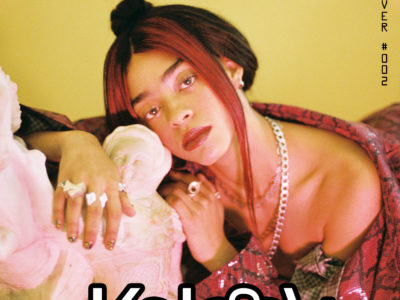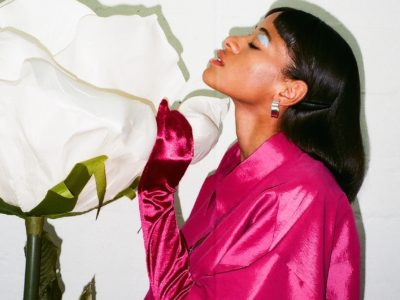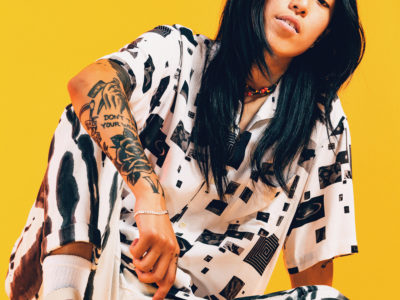Rick Rodney, Photographer
INTERVIEW BY : VICTORIA JESIONEK | PHOTOS BY : JAMES W. MATAITIS BAILEY | WRITTEN BY : LIZ RAISS
If you’re a connoisseur of ‘90s music, you’ve probably heard of STRIFE. If you were straight edge, you probably raged with its frontman, Rick Rodney. Now an accomplished photographer, Rodney’s aesthetic both in his commercial and personal work, takes heavy influence from the energy and anger of the hardcore scene he came up in. Despite his issues with and eventual departure from straight edge life, Rodney today recognizes the lasting positives that have endured throughout his entire life.
Here, Rodney breaks down in detail his path from a lost young punk to the father and husband he is today, the giddy highs and dark lows of the straight edge scene, and how he defines his politics and worldview today.
In the 90s, what distinguished the straight edge hardcore scene from the hardcore scene as a whole?
Everybody that I knew, including myself, got into punk rock first with bands like the Sex Pistols. If you were serious about it, it went hand in hand with skateboarding and subculture in general. So you’d start diving in and finding like-minded people. Within punk rock there’s the subculture of hardcore music, which is a little more aggressive. Aesthetically more t-shirt and jeans rather then spiked hair and leather, even from there what drew me into hardcore was straight edge. I was idealistic. I thought that this movement could really make a change in people’s lives but if you’re getting fucked up on Anheuser Busch and these big corporate companies’ products that’s a means of keeping the resistance at bay. So I gravitated to straight edge because I thought it was more punk than punk. There were obvious tell tale signs of being straightedge, like the x’s on the hands. There was an aesthetic to it that people went with at the time. You’re like I’m my own individual, but we’re all victims of this sort of sheep mentality. Like any culture involving teens and young adults we’re human, we’re messed up, it wasn’t perfect, there was a lot of bullshit politics within hardcore music.
So were your parents happy with you being a part of this scene?
They were.
They must have been conflicted.
Well they’re like you’re 16 years old and you’re outspoken about not doing drugs and drinking. That was kind of weird because most of the kids I was hanging out with were really into partying. I was in a band before STRIFE, before I was straight edge, and a couple of those guys got into heroin. It’s like you’re bored in the suburbs what are you gonna do?
But towards the end of the ‘90s the scene itself got really violent and you had a bunch of angry, pissed off kids. In my opinion and experience hardcore music, straight edge, the subculture of what is known as mainstream punk music, it has this cycle where young kids get in it and too involved because they’re idealistic and questioning everything and they take over the scene and make it their own. It seems to always happen when it gets violent at the end of a cycle.
And that ruined straight edge for you?
You tour the United States and everytime you go to a city the dickheads just start showing up more and more and the show is ruined because of four guys or a crew. Why is there a schism, why are you trying to be a tough guy, you’re just playing a part that you saw on tv- you’re a part of the problem and not the solution. So I was like fuck this, I wanna get out of it I need autonomy and I want to get away from the music. I moved to Hollywood and just sort of became what I considered a normal person and got a job and all that stuff.
So in the beginning you mentioned that skate was a subgenre in punk. Can you talk about how Thrasher Magazine was an influential publication for you.
That was my window into anything outside of where I lived so it exposed me to music, to my idols and heros like Marc Gonzales. It introduced me to The Chromats and The Misfits, bands that were really influential during pivotal moments in my life. I think Thrasher Mag had a lot to do with that. It was a catalyst for me saying this is cool, weird, and kind of awesome, all of it. As a kid you’re like that’s bitchin’.
Do you think that Thrasher’s imagery had an influence on your visual style?
I don’t know, now. It definitely had an impact when I started taking photos. In the 90s there was a distinct style in photograp?ing bands. The style was very dragged shutter using flash and now shooting bands is like no flash, really stagnant, really boring so when I shoot bands I love to shoot them in a small club, like a hardcore show. I love shooting them the way we shot them in the 90s. Everything like music, fashion, the arts has a cycle situation as well.
Has your 90s style cycled back to your work today?
100%. I’ve always been into fashion and I worked in retail for a long time. I always had my toe dipped in but also was still a hardcore kid. It was an oxymoron and I didn’t necessary care about labels, but I liked style. And I loved The Face Magazine, for aesthetics it is a huge influence on how I shoot fashion. It’s great, Juergen Teller, Terry Richardson started doing The Face – it was an English magazine with Kate Moss on the cover all the time. It had a punk ethos – it was high brow/low brow fashion and great photography.
People feel overwhelmed and destabilized in our current political climate, do you feel that way?
Yes and no. Yes, it scares me and before I was like goodness will prevail and America at its core is good, the people will realize that this guy is lame and what he is doing is undermining our democracy. The talking points that you hear on NPR, and I’m pretty liberal in how I vote and think about politics, there is this narrative out there that you’re against him or for him and there is no middle ground. I think Trump is a dickhead, I think he’s a moron but he’s really good at certain things which have nothing to do with politics- it’s more populist style and using fear. The silver lining is we needed someone like Trump to be elected so everyone would wake up and it would start a revolution even in the homes of my parents, white middle class sixty year-olds that are his base, would be like this guy is a bullshit artist, this is lame he totally duped us to get into office.
Do you feel like you’re more invested since he got elected?
I get overwhelmed because I go on any talk radio or any news outlet and they’re all talking about Trump and the drama and it’s like a sitcom. He’ll do something insane and lie blatantly and everybody wants to talk about the words he chose for like a week. They sit there and dissect the dumbest shit.
Bottom line is it’s obvious. I think that we’ve become idiots? I don’t know. Or we’re desensitized and we want the quick fix. The swipe the up and down of new shit, new shit.
When you started taking photos you started on tour. Is there a common thread that has followed through your work as it has become more commercial?
I would say I’m a big fan of retouching and enhancing photos so I use Photoshop on just about everything I do but only to tweak colors not really to make people look different. There is the artistic side and the commercial side of me and then there’s the editorial journalistic. I was really big into street photography. With that kind of storytelling you can’t really change anything- so there might be a sign in the shot that you’re like this sign is so gross I want to get rid of it or theres a car and it’s too modern it doesn’t look 50s and 60s enough, the little things. The artistic side always wins for me. I like cool visuals, I’m a very visually driven person and I was so obsessed with street photography- everything from Magnum, all their photographers and Joel-Peter Witkin, his work is very macabre, very visually striking and beautiful. I love Sally Mann, I love Arbus, I love the big photographers, there’s a reason why their well known- because they’re amazing at what they do.
Overall the artistic side usually wins it’s just a matter of balancing. If I’m shooting a lookbook and someone’s like ‘I like your style but can you tone it down a little bit?’ in the beginning I was like no man this is what you get now I’m like yea what does the project need? I’m not as invested in my creative vision now, I’m more like what does the client want. It’s understanding the balance. There’s a reason why you’re being hired its because what you do and how you do it but your essence doesn’t have to overpower who you’re working for or what you’re doing.
You made a transition as a hardcore musician to having a successful photo career- how did you and your bandmates transition your artistic selves into the real world?
Funny you bring that up because that’s an interesting thing amongst only hardcore kids or hardcore people, we always call ourselves hardcore kids. My bass player runs clubs like the Roxy, El Rey, and Fonda, he’s a fancy dude at Golden Voice. He travels a lot and is heavily involved in music. Our other guitar player Andrew does his own clothing line and is a producer. Todd is about to have a baby, and works with his brother on computer software. Fundamentally everyone is still hardcore kids at least with the group of friends that I grew up with and still talk to today. They’re pretty rad, they’re just good people. None of them have fallen off.
Do you think straightedge was a base for that?
Yeah, it was a very formative time in our lives especially getting into at at such a young age. I was 12 or 13 when I started getting into punk and lucky for me my mentors and people that influenced me were good people and steered me in the right direction. Like don’t go to shows and don’t be a dick. You don’t go in and start punching people and acting dumb. Yes, it’s violent and it’s aggressive but it’s about your intent.
The music is loud, its aggressive but the meaning behind it is all super positive for me.
What is the intent?
The intent is to release a lot of pent up aggression and anger with consenting individuals around you that are there for the same reason. The music is loud, its aggressive but the meaning behind it is all super positive for me. That has always been what I’ve offered. When we play a show I’m like you guys ‘this is your home think of it as your family, you treat your family better than you treat anybody else and the outside world will misunderstand you and think you’re weird and that’s why you’re here in the first place’. So here you take care of one another and don’t fuck it up. It will last you a lifetime and it has had an effect on me my whole life. Now I have a wife and baby who is about to be one and everybody says it’s a game changer and all that shit and it’s true. I see the world a bit differently now. I’m still the same dude but at the same time I’m not getting younger I just want to be solid and be positive and be a positive influence and do good work for people and set an example for him and all the young kids coming up.
The scene is a bit polarizing because you fall into your own little family. Now you’re doing mainstream work- do you feel that contradiction?
Yea 100% and a lot of my commercial work people don’t see. I’m selling a product so that necessarily isn’t what I’m trying to advertise as a photographer. It’s vital and it’s necessary but it’s not who I am. I provide a service and I understand my part in that machine. I try to work with people that are like-minded. I work with brands that are authentic people, no one’s like ‘oh I’m doing a denim line to make a bunch of money,’ they’re doing denim because they love denim. Everybody grows up, priorities change and we have to pay for our shit but fundamentally I want to shake hands with you and look you in the eye. Let’s all just do the best work we can and not have it be such a bad influence on the world.
Do you think that hardcore kids today are more open to a cross over into different genres and styles?
Yes. As open minded as I claimed to be when I was 16, 17, I was very narrow minded. I wouldn’t listen to Pink Floyd because it wasn’t straight edge. I was never like ‘fuck that band they’re not a hardcore band’ but I was like that’s not my vibe- I wouldn’t give it a chance. Today I’ll listen to anything. And the scene today- my friend and I were at a show and it was good but it wasn’t really our scene and we were talking about the influence of mainstream culture and pop culture coming into the hardcore scene with people like Tyler, the Creator. Hip hop and punk have always intermingled since the 80s but that guy and a handful of other people really pioneered the new generation so you see kids at shows that look like hip hop kids or I don’t know what the fuck they are. Before I was like, ‘oh you’re a crust punk, you’re a peace punk, you’re straight edge, you’re a skate punk, it was very compartmentalized. So now more than ever for me it’s less about the aesthetic and more about the intent. So it kind of comes back full circle.
So come to the show, I don’t care if it’s your first show or 100th show or what you’re wearing or if you’re hair is punk or shaved or long, it’s about showing up- are you bettering the situation or are you making it worse? I think in a lot of ways the dropping of the walls because of internet and accessibility has benefited music because it’s opened doors so bands can make a living because they can do what they do for a lot of people. Festivals are super cross-pollinated and genre-bending and it’s cool.
You mentioned you listen to all kinds of music now, what are you playing for your baby?
I’m playing a lot of punk for him, like The Misfits and things I grew up on. Things that were fun for me to dig that are not super hardcore. In the mornings I’ll take him on long walks in the neighborhood and play early rock steady dancehall music for him like pre-reggae Jamaican R&B. I don’t know much about that music so it’s a learning process for me. And how am I finding it? Going on Spotify and typing in Desmond Decker and going through the algorithm. I’m learning about things I never knew about before, he seems to dig it and it has a punk ethos. I’ll even play classical that I was never into that much, stuff I’ve gotten into over the years. Just good music. That’s where I’m at musically, with photography, and with products. Was it made to last a little bit? Certain things you can recognize and understand the importance of these things because of the integrity behind them.
Do you play him STRIFE?
Yeah of course and I can’t wait to take him to a show, hopefully we’ll still be playing. Not quite yet but soon. He’s about to be a year so I’ll throw him in the pit.













